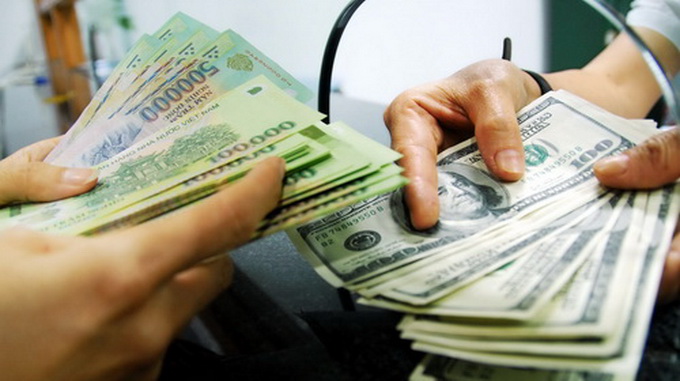The recent devaluation of the Vietnam dong is a proactive move of the State Bank of Vietnam (SBV) to support exports in the last six months of 2014, an SBV senior official has said.
On Wednesday evening, the SBV which is the central bank announced a decision to devalue the dong by one percent starting Thursday.
In the first five months of the year, exports grew by 15.4 percent year on year, so the central bank should adjust the exchange rate to support exports in the last six months of this year, said Nguyen Thi Hong, head of the SBV's Monetary Policy Department.
Growing exports, in turn, will also support economic growth in the second half of the year so that the realization will meet the target previously set by the government, Hong said.
Explaining the exchange rate adjustment, Hong said that in the first five months of 2014, the local money and foreign exchange were stable and foreign currency supply was guaranteed.
The country enjoyed a $1.6 billion trade surplus during the period, bringing in a $10 billion surplus in the national balance of payments.
The stabilized money market also helped the SBV to buy a large amount of foreign currency for the national foreign exchange reserves, bringing the country’s foreign exchange reserves to $35 billion, the highest rate ever.
In the early months of the year, local credit institutions have sold more foreign currency to the central bank. Therefore, the SBV had a chance to buy a huge amount of foreign currency worth about $10 billion for the foreign exchange reserves.
In addition, the inflation rate, represented in consumer price index (CPI), rose only 1.08 percent in May compared to late 2013, so the exchange rate adjustment will do no harm to the inflation control target of the government, she said.
Regarding whether the dong devaluation will have a negative affect on the banking system, Hong has already said that it will not.
According to figures compiled by credit institutions, the current banking system is running a negative reserve of foreign currency as they have all sold to the central bank.
As a result, this time the exchange rate adjustment will partially affect the financial costs of local credit institutions.
However, the exchange rate adjustment will contribute to supporting exports, thereby spur economic growth, facilitate foreign exchange market stability, and ensure liquidity of foreign currency to meet the legal demand for foreign currency of the economy.
After the adjustment, the central bank will implement measures to stabilize the local foreign exchange market, Hong added.
|
In a press release dated June 19, 2014, the Hong Kong Shang Hai Banking Group (HSBC) said that the dong depreciation is not the start of a trend. “This should not come as a major surprise given that U.S. dollar-Vietnam dong had been trading on the top side of the daily band and given recent comments from the SBV governor.” “We still think the outlook for the VND should be relatively stable from these levels over the coming year, given the better balance of flows and build-up of foreign exchange reserves. However, lower real interest rates could pose a risk further out if demand and inflation start to pick up.” |
Like us on Facebook or follow us on Twitter to get the latest news about Vietnam!




















































